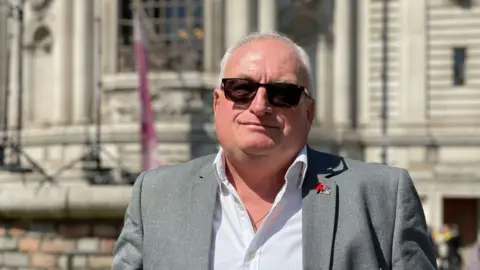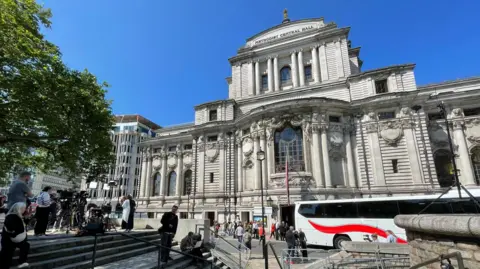Infected blood victim's 40-year campaign for justice
 Shaun Whitmore/BBC
Shaun Whitmore/BBCA contaminated blood victim said the long-awaited report about the NHS scandal had brought an end to his "exhausting" campaign.
The Infected Blood Inquiry said the authorities covered up the scandal after knowingly exposing victims to unacceptable risks.
Alan Burgess was 27 when he was given blood infected with HIV and hepatitis C while being treated for haemophilia.
The 66-year-old, from Ipswich, was at Central Hall Westminster earlier for the report's publication.
Sir Brian Langstaff, chair of the inquiry, concluded the scandal should have been largely avoided.
Prime Minister Rishi Sunak is due to make an official apology to victims in the House of Commons.
'Dignity stripped'
"This wasn't an accident what happened to us," Mr Burgess said, prior to the report findings being released.
"It means the end of me writing letters to Prime Ministers, seeing MPs, countless trips to Parliament which is exhausting when you're trying to fight two viruses.
"But it won't mean an end to anything health wise."
Mr Burgess said his diagnosis completely changed his life and how he had to close down his painting and decorating business.
"You've got a grown man with a family, having to live off benefits and charity - I felt like all my dignity had been stripped from me," he explained.
"No man should be made to do that through no fault of his own."
At one point, Mr Burgess said he was admitted to a psychiatric hospital as his mental health deteriorated.
"I met all these lads in a campaign support group but they were dying," he added.
"That wasn't natural for that to happen - a chap in your 30s going to funerals and thinking when is my time coming."
 Shaun Whitmore/BBC
Shaun Whitmore/BBCMr Burgess, who had been campaigning since his diagnosis, said the most difficult thing throughout the years was that government "took no responsibility".
"My first letter was to Margaret Thatcher in 1987 but all I got back was loads of sympathy and as for an inquiry, 'there's nothing to be heard'," Mr Burgess said.
"But we found out there was a lot to be heard from an inquiry.
"It's now time for them to face up to their responsibilities. It's time for them to recognise what they've done."
Monday's report was handed to the Cabinet Office at 07:00 BST and has since been made available to the public.
It said victims had been failed "not once but repeatedly" by their doctors, bodies including the NHS and the government.
Follow Suffolk news on Facebook, Instagram and X. Got a story? Email eastofenglandnews@bbc.co.uk or WhatsApp us on 0800 169 1830
